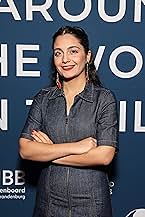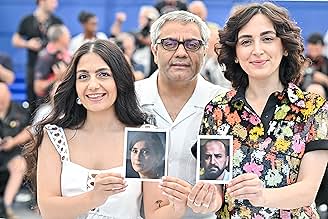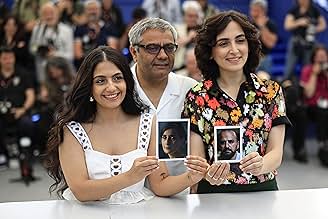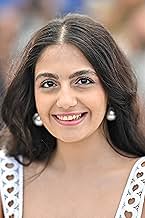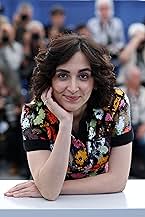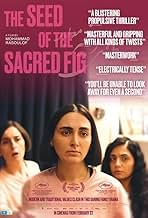Nell'agitazione di Teheran, il giudice paranoico Iman impone severe regole a moglie e figlie dopo aver perso la pistola, mettendo a dura prova i legami familiari mentre la società crolla.Nell'agitazione di Teheran, il giudice paranoico Iman impone severe regole a moglie e figlie dopo aver perso la pistola, mettendo a dura prova i legami familiari mentre la società crolla.Nell'agitazione di Teheran, il giudice paranoico Iman impone severe regole a moglie e figlie dopo aver perso la pistola, mettendo a dura prova i legami familiari mentre la società crolla.
- Regia
- Sceneggiatura
- Star
- Candidato a 1 Oscar
- 36 vittorie e 71 candidature totali
Recensioni in evidenza
A provocative & politically charged drama that also serves as a scathing critique of oppressive rule through the devastating account of a family's unraveling, The Seed of the Sacred Fig is an increasingly incendiary story that takes its time to acquaint us with the family dynamics before seeds of paranoia & mistrust take root in the household and turn the whole thing into a familial nightmare.
Written, co-produced & directed by Mohammad Rasoulof, the main incident that sets the plot into motion takes place over an hour into the picture but in that time, it does familiarise us with the volatile situation & civil unrest taking place outside the house that complicates things a lot more within the household. Rasoulof is patient in his approach and provides ample space for the characters to breathe.
The first half covers the clash in ideology & perspective that unfolds between the ladies of the house over the real-world riots & protests taking place outside their apartment, the footage of which is interspersed within the narrative. The film is expertly shot but the narration is rather clunky and only held together by strong performances from the cast. The runtime is also often felt, and the final act overstays its welcome.
Overall, The Seed of the Sacred Fig is a bold, brave & audacious effort from Rasoulof who risks his own life & puts everything on the line to deliver a scorching indictment that's timely & urgent in more ways than one. The slow-burn pace makes the length all the more daunting despite the premise being interesting on paper and the film as a whole needed to be more tightly-knitted to make its powerful message heard with thunderous clarity.
Written, co-produced & directed by Mohammad Rasoulof, the main incident that sets the plot into motion takes place over an hour into the picture but in that time, it does familiarise us with the volatile situation & civil unrest taking place outside the house that complicates things a lot more within the household. Rasoulof is patient in his approach and provides ample space for the characters to breathe.
The first half covers the clash in ideology & perspective that unfolds between the ladies of the house over the real-world riots & protests taking place outside their apartment, the footage of which is interspersed within the narrative. The film is expertly shot but the narration is rather clunky and only held together by strong performances from the cast. The runtime is also often felt, and the final act overstays its welcome.
Overall, The Seed of the Sacred Fig is a bold, brave & audacious effort from Rasoulof who risks his own life & puts everything on the line to deliver a scorching indictment that's timely & urgent in more ways than one. The slow-burn pace makes the length all the more daunting despite the premise being interesting on paper and the film as a whole needed to be more tightly-knitted to make its powerful message heard with thunderous clarity.
The movie "The Seed of the Sacred Fig" is a political thriller centered on Iman, who is searching for a promotion in Tehran's judicial system. As he ascends in his career, he is torn between personal and professional conflicts, facing moral dilemmas within his family amid the upheaval of the 2022-2023 Iran protests.
The movie is captivating for its portrayal of the clash between an archaic, sexist, and oppressive government driven by religious ideals and the freedom of expression, culture, and modern values embraced by the younger generation. This duality extends into the family dynamic, where personal beliefs collide with political pressures, creating a powerful internal conflict.
Director and writer Mohammad Rasoulof delivers an emotional movie by blending real footage of student protests following the death of Mahsa Amini in 2022.
Another standout achievement is the title The Seed of the Sacred Fig, which perfectly captures and summarizes the essence of the movie. It's a perfect and beautiful choice that sums up the story beautifully.
The movie is captivating for its portrayal of the clash between an archaic, sexist, and oppressive government driven by religious ideals and the freedom of expression, culture, and modern values embraced by the younger generation. This duality extends into the family dynamic, where personal beliefs collide with political pressures, creating a powerful internal conflict.
Director and writer Mohammad Rasoulof delivers an emotional movie by blending real footage of student protests following the death of Mahsa Amini in 2022.
Another standout achievement is the title The Seed of the Sacred Fig, which perfectly captures and summarizes the essence of the movie. It's a perfect and beautiful choice that sums up the story beautifully.
Where do I even begin ?.. Words like freedom and dignity are not just mere words but they carry in them the deepest pain and suffering of all of humanity, Pain and suffering that were unawaredly endured for thousands of years through social and all kinds of oppression at the hands of a few oppressors and many a times by the very social norms that the humanity had laid out for itself through the truncated understanding of its own social condition in the larger scheme of collective human existence, how do you even go about freeing yourself from the clutches laid out by the collective oppression that has become your identity and the very means to your existence, how do you even go about waking up the society to the cultural cruelty that it's inflicting on its own cultural freedom and social well-being, The seed of the scared fig is not just a movie about Iran and it's women and their struggle over theocratical oppression to expand the social space for their personal freedom to reach the realms of human dignity and it's social acknowledgement, it's a much deeper study on the conflict that arises between the all empowered state through whatever social dictum and the individual freedom which forms the basis of the creation of the sub-unit called family, the very basis on which societies as such come into existence and seek to thrive in various forms and colours...This movie carries a seed in it that humanity needs to cherish for its own better future ...
The seed of the sacred fig is the first relevant, powerful film about the Iranian rebelion that took place in 2022. The Woman, Life, Freedom's movement was born right after the arrest and death of Jina Mahsa Amini, a student that did nothing but remove her veil. The director takes us down to a family of an Iranian judge (working for the State and the Mollah 's regime) who is about to receive a promotion that is supposed to change his life right at the moment the 2022 revolution starts. We spectators somehow live this key period of Iran through the eyes of this middle class family which is about to upgrade its living conditions. We are emerged in their every day life until the gun of the father (the judge) disapears or gets stolen inside their home.
The film features a fantastic script, wonderful actors and images of an unknown Iran. You can see Iran like we can rarely see it, with its modernity, its rich history and ancient monuments, its poverty as well as its drawbacks. Like in many Iranian films, the spectator is plunged into complex situations with ethical questions which oblige to choose between moral, personal values and loyalty to the regime: Shall I wear this veil or another (less provokative one) ? Should I go the university despite of the strikes ? Shoulld I ask a favor to my neighbor and take the risk of revealing my family's problems? The ethical questions are everywehre, and they are direct consequences of the heavy oppressive regime that has ruled Iran for now decades. All these questions are faced with dignity and sense of duty by the characters , with sometimes even loyalty towards a regime who could not care less about its people. Through these situations are revealed the lack of freedom, the oprression over women, the complicity of those who take profit of this regime and of course the brutality of a regime condemned to sacrifice its own people in order to survive.
The latter will be perfectly depicted through the fate of the father willing to do his job respectfully but obliged to corrupt himself and sacrifice his people in order to survive to this revolution no matter how painful it is.
I particularly enjoyed the insight into the Iranian middle class. Being able to see and imagine what is an every day life for women in Iran is difficult to figure from the Western World. The more the film lenghts the better it gets as you can clearly see the impasse into which the country has plunged, and with it its inhabitants (and in this case this family) condemned to find a guilty among them.
Little by little, we can spot the seeds of discord germinating in this family, into the society, among students, and throughout the world thanks to social networks. That's the other revelation of this film. Social network is the key; that's the tool through which the song Baraye resonates, as well as images of police violence are spread, proofs of the oppression are accumulated, they are the hopes of Iran. The regime can no longer hide behind outrageous lies, the seeds of rebellion are now spread everywhere and the complice of the regime can no longer hide.
A promising outcry and a promising motto for the future Iranian society: Woman, Life, Freedom that we hope, will eventually change Iran for good.
The film features a fantastic script, wonderful actors and images of an unknown Iran. You can see Iran like we can rarely see it, with its modernity, its rich history and ancient monuments, its poverty as well as its drawbacks. Like in many Iranian films, the spectator is plunged into complex situations with ethical questions which oblige to choose between moral, personal values and loyalty to the regime: Shall I wear this veil or another (less provokative one) ? Should I go the university despite of the strikes ? Shoulld I ask a favor to my neighbor and take the risk of revealing my family's problems? The ethical questions are everywehre, and they are direct consequences of the heavy oppressive regime that has ruled Iran for now decades. All these questions are faced with dignity and sense of duty by the characters , with sometimes even loyalty towards a regime who could not care less about its people. Through these situations are revealed the lack of freedom, the oprression over women, the complicity of those who take profit of this regime and of course the brutality of a regime condemned to sacrifice its own people in order to survive.
The latter will be perfectly depicted through the fate of the father willing to do his job respectfully but obliged to corrupt himself and sacrifice his people in order to survive to this revolution no matter how painful it is.
I particularly enjoyed the insight into the Iranian middle class. Being able to see and imagine what is an every day life for women in Iran is difficult to figure from the Western World. The more the film lenghts the better it gets as you can clearly see the impasse into which the country has plunged, and with it its inhabitants (and in this case this family) condemned to find a guilty among them.
Little by little, we can spot the seeds of discord germinating in this family, into the society, among students, and throughout the world thanks to social networks. That's the other revelation of this film. Social network is the key; that's the tool through which the song Baraye resonates, as well as images of police violence are spread, proofs of the oppression are accumulated, they are the hopes of Iran. The regime can no longer hide behind outrageous lies, the seeds of rebellion are now spread everywhere and the complice of the regime can no longer hide.
A promising outcry and a promising motto for the future Iranian society: Woman, Life, Freedom that we hope, will eventually change Iran for good.
SotSF is pretty great until near the end when the tension started to dissipate (or maybe it is because if you show a gun for that long, the anti-climax of it *not* going off should be earned and I am not convinced this did). Maybe it was seeing so many putting this in the top, top pantheon of the year's films; not only it's Oscar nomination, but the nature of how it was basically smuggled out of the country to be Screened at Cannes (itself a bold and inspiring story to get to where it found distribution for much of the world) brings an expectation, not to mention the run time. The fact that it is really really profound and strong in the ways that matter counts though, especially as a film about family dysfunction and how the roles they've been put into are disastrous.
I loved how the mother was not that sympathetic to the daughters early on, and yet there were more than a few wrinkles in what the filmmaker shows us of the distance between husnand and wife - all those nights where he comes home and she at first stays up but then falls asleep as he is out longer and longer (and to look back after the film is done at those scenes and to understand *why* he was out so long having "meetings" at work adds to the chilling nature of his response) - and that if it wasn't for this missing gun something else was going to break in this family some way. And this is a time period that is not some far off context but a society that is actively in religious oppression and armed to the teeth.
Some of the film is shot fairly standard, coverage being largely shot reverse shot and so forth for dialog, but what's impressive to me is when Rasoulof breaks from this, like when the girl's friend is at the house with the battered face and the mother takes time to pick out the pieces of weaponry from her wounds. That is the most upsetting part of the whole film if I take stock of it all, in how carefully she takes in picking out those pieces, and it's also from here that the mother Najmeh may not say it outright (and she still has a lot of motherly consternation for her daughters after this, especially in the "it'll upset your father" realm, Golestani is in like 6 dimensions with her performance), but she is changed and has to see things differently now. Or will she, is a key question.
It does lean more into a Genre/Thriller kind of story in the last half hour - almost like something out of the Shining if one were to say more like a Horror film (only our dad/husband just has his own maniacal paternal paranoia and self hatred to blame) - and that isn't quite as absorbing as just seeing this family at home. But we do need that moment where the two people following the family on the road confront the dad, for us to see just what extent they are at now in the story, and that it almost has to unravel from there with what the gun is really all about. And all of this with the immediate and harrowing backdrop of the protests and demonstrations of the period, it makes for an extremely satisfying film.
I loved how the mother was not that sympathetic to the daughters early on, and yet there were more than a few wrinkles in what the filmmaker shows us of the distance between husnand and wife - all those nights where he comes home and she at first stays up but then falls asleep as he is out longer and longer (and to look back after the film is done at those scenes and to understand *why* he was out so long having "meetings" at work adds to the chilling nature of his response) - and that if it wasn't for this missing gun something else was going to break in this family some way. And this is a time period that is not some far off context but a society that is actively in religious oppression and armed to the teeth.
Some of the film is shot fairly standard, coverage being largely shot reverse shot and so forth for dialog, but what's impressive to me is when Rasoulof breaks from this, like when the girl's friend is at the house with the battered face and the mother takes time to pick out the pieces of weaponry from her wounds. That is the most upsetting part of the whole film if I take stock of it all, in how carefully she takes in picking out those pieces, and it's also from here that the mother Najmeh may not say it outright (and she still has a lot of motherly consternation for her daughters after this, especially in the "it'll upset your father" realm, Golestani is in like 6 dimensions with her performance), but she is changed and has to see things differently now. Or will she, is a key question.
It does lean more into a Genre/Thriller kind of story in the last half hour - almost like something out of the Shining if one were to say more like a Horror film (only our dad/husband just has his own maniacal paternal paranoia and self hatred to blame) - and that isn't quite as absorbing as just seeing this family at home. But we do need that moment where the two people following the family on the road confront the dad, for us to see just what extent they are at now in the story, and that it almost has to unravel from there with what the gun is really all about. And all of this with the immediate and harrowing backdrop of the protests and demonstrations of the period, it makes for an extremely satisfying film.
Lo sapevi?
- QuizDirector Mohammad Rasoulof was originally scheduled to take part in the 2023 Cannes Film Festival as a jury member of the Un Certain Regard section. However, he was arrested in July 2022 after criticising the government's crackdown on protestors in the southwestern city of Abadan in Iran over deadly building collapse. On May 8, 2024, Rasouloff's lawyer announced that he has been sentenced to eight years in prison as well as flogging, a fine and confiscation of his property. On May 12, 2024, Rasouloff announced that he managed to flee Iran and was staying at an undisclosed location in Europe. On May 24, 2024, Rasouloff attended the film's premiere in Cannes and on the red carpet he held up photos of two of the film's actors, Soheila Golestani and Missagh Zareh.
- Curiosità sui creditiOpening credits: "Ficus Religiosa is a tree with an unusual life cycle. It seeds, contained in bird droppings, fall on other trees. Aerial roots spring up and grow down to the floor. Then, the branches wrap around the host tree and strangle it. Finally, the sacred fig stands on its own."
- ConnessioniFeatured in 82nd Golden Globe Awards (2025)
I più visti
Accedi per valutare e creare un elenco di titoli salvati per ottenere consigli personalizzati
Dettagli
Botteghino
- Lordo Stati Uniti e Canada
- 860.139 USD
- Fine settimana di apertura Stati Uniti e Canada
- 35.230 USD
- 1 dic 2024
- Lordo in tutto il mondo
- 6.589.945 USD
- Tempo di esecuzione
- 2h 47min(167 min)
- Colore
- Mix di suoni
- Proporzioni
- 2.35 : 1
Contribuisci a questa pagina
Suggerisci una modifica o aggiungi i contenuti mancanti



